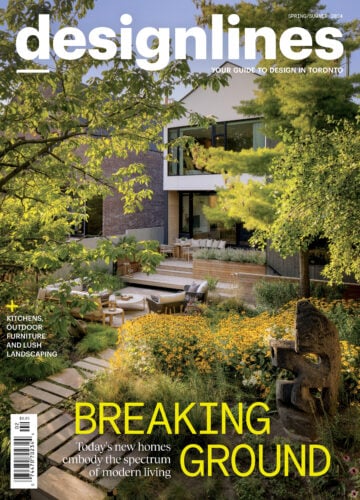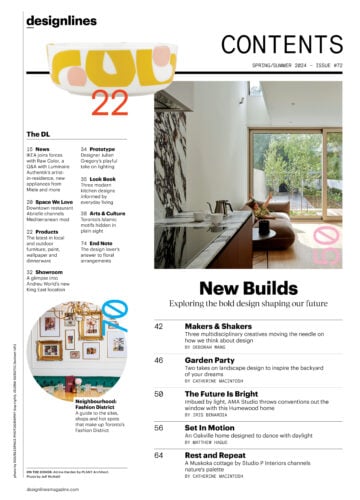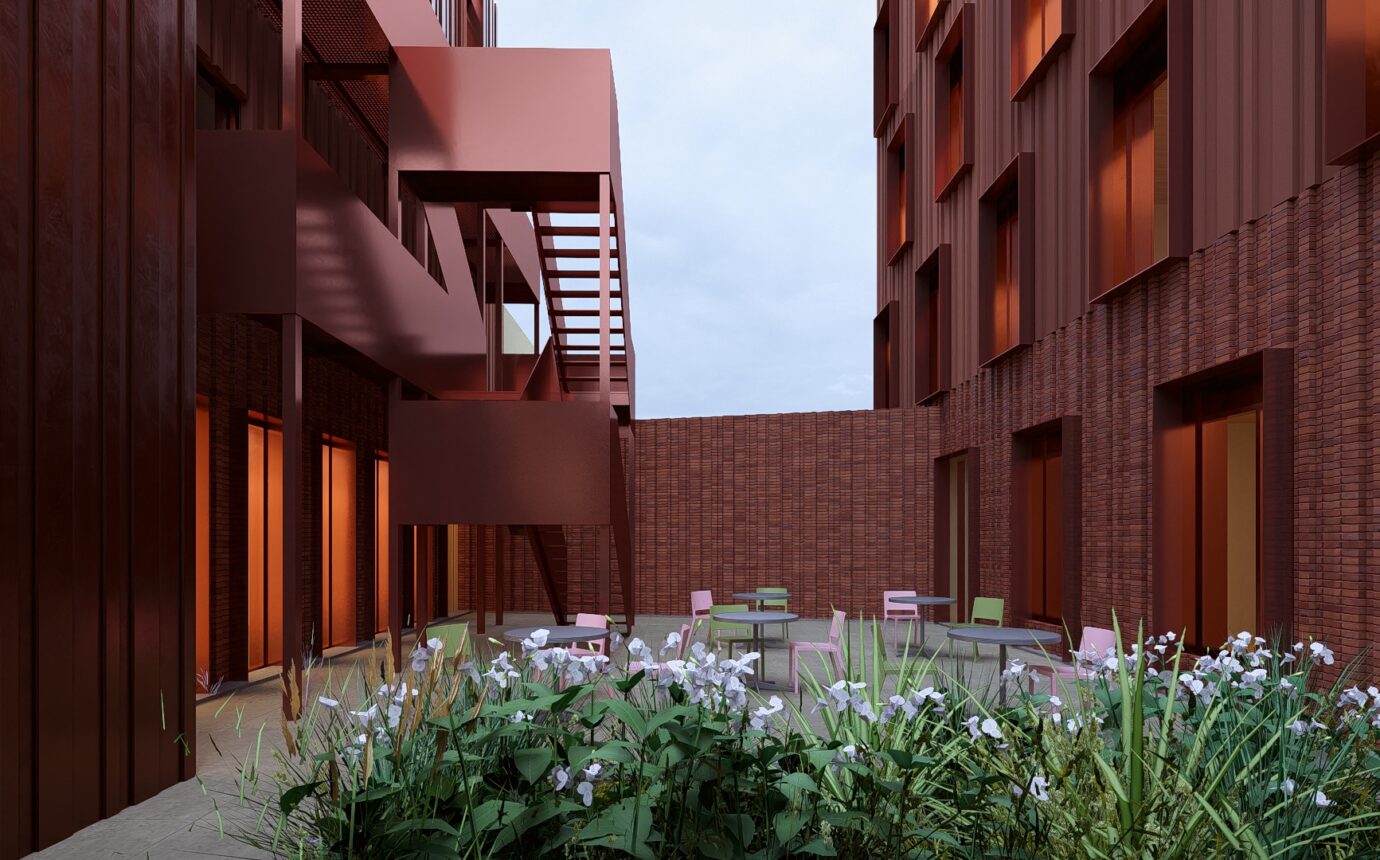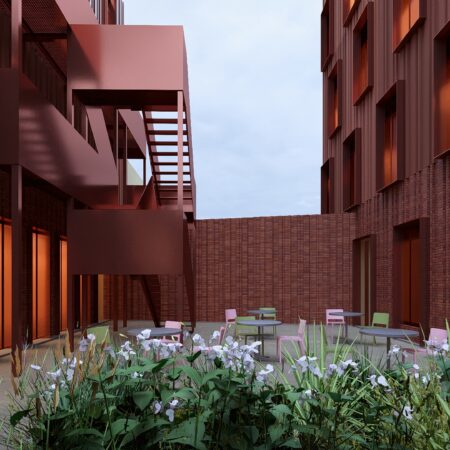At Home With MSDS Studio
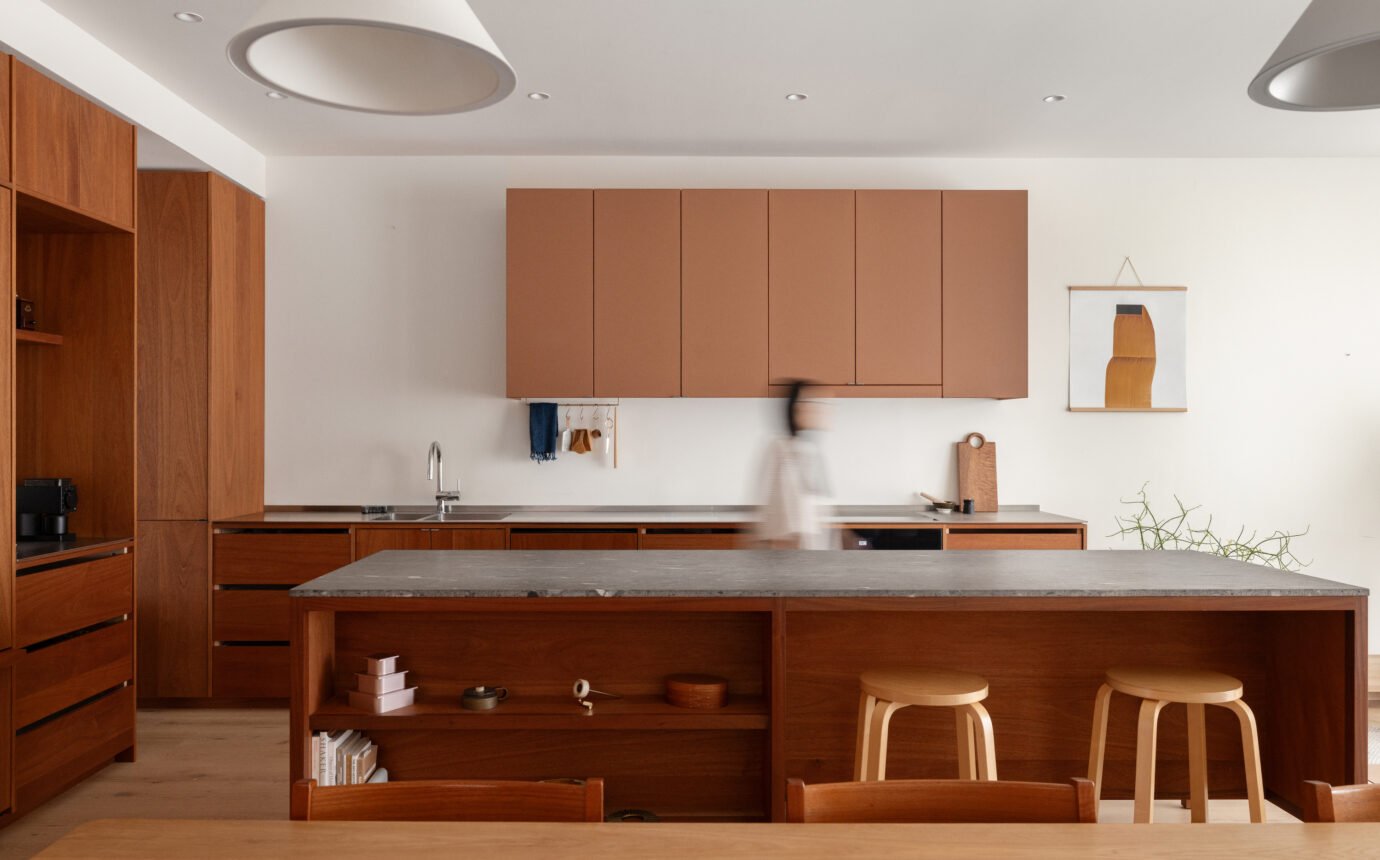
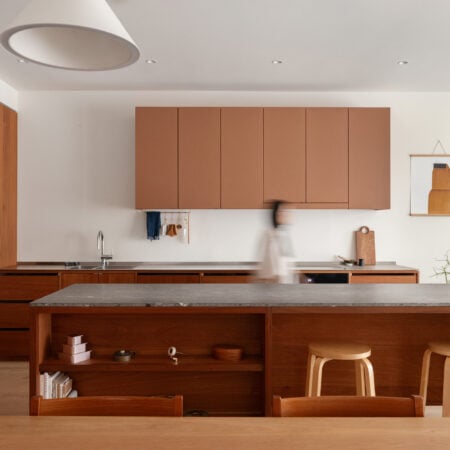
In Lakeshore Village, the Toronto design power couple bring their industry experience into a multi-generational family home
Back when they were still renting in Roncesvalles, Jessica Nakanishi and Jonathan Sabine set off on a bike ride and let the nice weather lead them to Lakeshore Village. Almost immediately, the couple realized that they had found their future neighbourhood. Charmed by its close proximity to the water and the calm antidote that it offered to big city life, they focused their real estate hunt on properties that would leave them with enough leftover cash to flex their design muscles.
As partners of local design studio MSDS, Nakanishi and Sabine have envisioned interiors for Shopify and the flower shop Flùr, as well as furniture for international brands like Muuto and Normann Copenhagen. While they were eager to put their skills to use by building their new house from scratch, they were still mindful of avoiding unnecessary demolition. “We didn’t feel right about tearing something down just because it didn’t fit our aesthetic,” says Sabine. “Whatever we bought had to be nice enough to live in for two years while we designed our new place, but bad enough to then be torn down. So, we went for an old bungalow with a wide floor plate, painted it, and moved in.”
Flash forward several years, and one key detail of that original structure endures in the modern two-storey (complete with a basement in-law suite for Nakanishi’s parents) that has since replaced it: Nakanishi and Sabine grew so accustomed to the mahogany of their temporary home’s kitchen that they opted to use the same type of wood for the cabinets in their new digs. This millwork is fabricated by frequent MSDS collaborator Jake Whillans, who had previously worked with the couple on the benches that they designed for MOCA. “He doesn’t usually do residential work, so it was a bit of a favour,” says Nakanishi. “But we wanted things built to his standards.”
Entering the Lakeshore Village home, it is easy to appreciate why this millwork had to be done right: elegant storage solutions are a key part of the project’s identity. Nakanishi and Sabine may spend their days envisioning furniture for minimalist Scandinavian companies, but they are also the parents to a young son, Francis—with all the delightful chaos that entails. “We really needed places to hide everything, because we don’t like to see any clutter,” says Nakanishi.
Their setup delivers in spades: The kitchen features an expansive pantry wall, while the front hallway’s stretch of built-in wardrobes provides ample space for stashing coats, shoes and even — thanks to an L-shaped alcove that runs behind the other compartments — bicycles. The entry’s Japanese genkan is another practical solution. “It’s a sunken, tiled area where all the messy stuff comes off,” Nakanishi says. “We weren’t working towards some idea of perfection — we were designing to reflect reality, and everything that takes place inside a house: Good days and bad days, from the joy of having kids to the sorrow of losing parents,” adds Sabine.
In line with that long-game approach, the designers selected a hard-wearing palette that will gain character with age. The upper kitchen cabinets feature linoleum doors, while brushed stainless steel gives the worktop below a rugged sheen. “It has the potential of looking really utilitarian, but it’s surrounded by so much wood and warmth,” says Nakanishi. “I know a lot of people don’t like it because it scratches, but to us, that’s just part of the charm.” Appliances from JennAir Canada’s Noir Design Expression range include an induction cooktop installed flush with this counter and a fridge that blends seamlessly into the pantry zone. “The best thing I can say about them is that everything just disappears,” says Nakanishi—the ultimate compliment, coming from a minimalist.
Moving to the dining area, MSDS designed the custom eight-seater table with dinner parties in mind. Meanwhile, their dining chairs were salvaged from Nakanishi’s parents’ old home and later reupholstered. “Jess’s dad bought a whole set of Danish furniture for like $1,500 some 40 or 50 years ago,” says Sabine. “When we were going through their house to help them sell it, they thought that no one would want to buy teak — they didn’t realize that it would be so easy to sell. And it was all in great condition,” Nakanishi adds. In a way, that lesson echoes the overall spirit of her and Sabine’s home: a well-built piece of design that’s made to last.
The other driving force behind the duo’s vision was a desire to maintain a palpable sense of breathing room—hence the staircase’s placement at the back of the home rather than the front. “I like when you come down and start your day in a welcoming, more private space, rather than immediately facing the front door,” Nakanishi says. Her and Sabine’s emphasis on flexible, generously proportioned transition zones continues on the second floor. “There’s this large space at the top of the stairs that’s kind of just for circulation,” Nakanishi notes. “The impulse in residential design is to make every square foot count, and we could have packed in a fourth bedroom. But not everything needs to be so dense. I like unoccupied space. Maybe when Francis gets older, it will have a couch and become a video game section or something.”
Building on their focus on airy interiors, Nakanishi and Sabine also designed their home to operate comfortably and efficiently throughout all four seasons. To accomplish this, the couple adopted principles of Passive House architecture, which manifest in part in the building’s strategic window placements. “We don’t like having artificial light, so we have as much natural light as possible, without having excess openings,” says Sabine. (One notable exception is two of MSDS’s cone-shaped Annular pendants, manufactured by Danish brand Woud, which hang above the dining table.) As evidence of the abundant sunlight, every houseplant is currently thriving — even a fiddle leaf fig that Nakanishi and Sabine picked up on the side of the road in an especially sorry state.
Other energy-savvy decisions are less easy to spot. “A lot of our budget went into materials with high R values that provide great insulation — meaning we barely use our air conditioning in the summer and only have the heat on low in the winter,” Sabine says. “We actually came here ourselves to tape up the vapour barrier during construction and make sure that everything is airtight. And the roof is also super reflective, so it doesn’t absorb nearly as much heat.” For its part, the house’s aluminum façade cladding has been a major point of intrigue in the neighbourhood. “Some people have asked us, ‘When are you putting the siding on?’ But other people — architects, mostly — have come by to voice their appreciation,” says Nakanishi.
The house has also become a calling card of sorts, attracting new clients eager to put MSDS to work on modern homes of their own. “Our approach is similar whether we’re designing for ourselves or not,” says Nakanishi about the studio’s growing roster of residential projects. “We get really personal with our clients and try to imagine the living standards that we’d have.” Her and Sabine’s time in their new lodgings has also inspired the duo to start thinking about future furniture ideas. An antique secretary desk placed next to the staircase (and below Nakanishi’s painting of the Hancock Shaker Village in Massachusetts) was the product of an extended search on Facebook marketplace. The process led Nakanishi and Sabine to appreciate that the current furniture market lacks compelling modern interpretations of the archetype. Perhaps stay tuned?
As they’ve moved in other past MSDS designs—the Stock side table that they launched with Normann Copenhagen sits in one corner, and the Ancestor chair in another—they identified a further limitation of their portfolio. “We really need to design a sectional,” says Nakanishi with a laugh. Thankfully, a second great Facebook Marketplace find—a B&B Italia sofa sourced for $300 in Lancaster—is serving as handsome seating in the meantime. “The first thing the owners said when we picked it up was that they’d had three generations of kids play on it. And it just keeps going,” says Nakanishi. Newly reupholstered, it now faces a narrow platform inspired by a Japanese sitting ledge. “It’s a great way to showcase plants or products, but we can also put cushions on it when we’re playing with Francis low to the ground, and it’s reinforced to someday support a wood-burning stove,” says Nakanishi. Speaking of the future, MSDS has several launches in the works, including a new pendant collection with RBW and a coffee table version of the Halves side table that they designed for Muuto—another piece that turns up in their living room.
But as much as Nakanishi and Sabine’s Lakeshore Village home may be a celebration of great modern design, where it really shines is in the way that it captures the heart of family life. “Just seeing Francis move through the space is a joy,” Nakanishi says. “All kids have this endless energy to run, and there have been so many pleasantly satisfying moments of engagement with the house from running around playing endless hide and seek in this physical layout.”
Moving Nakanishi’s parents into the basement suite adds another layer of multigenerational magic. “If we’re busy doing something, our son will barge into their unit,” says Sabine. “But it’s a good balance — they still have their own autonomy and space, with lots of light and a nice kitchen, but we’re all here to help each other.” His and Nakanishi’s next major project is to landscape the backyard. MSDS is about to launch a bird bath with Finnish brand Pidät—and they’re going to need a garden to put it in.
